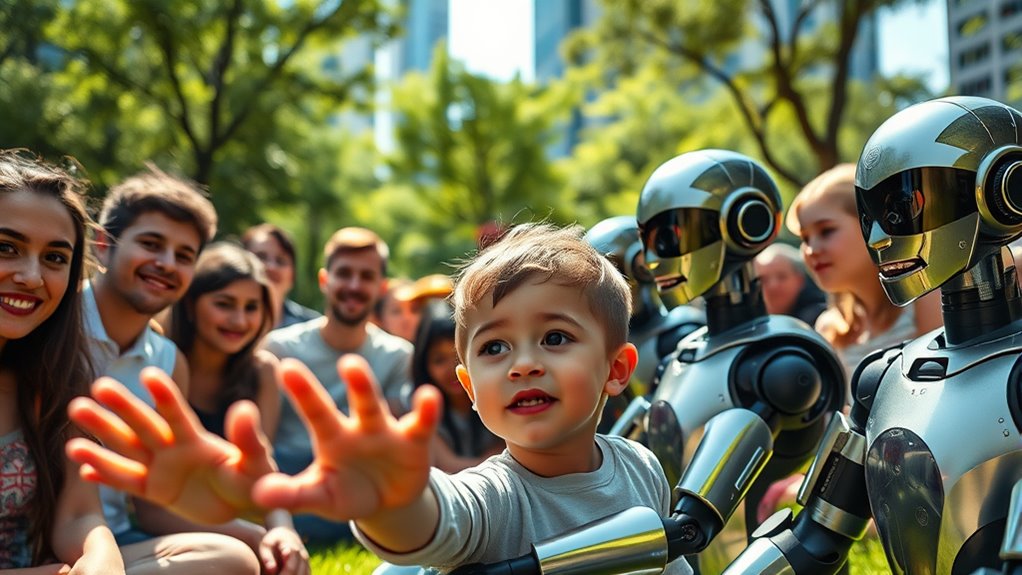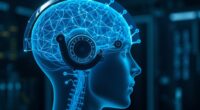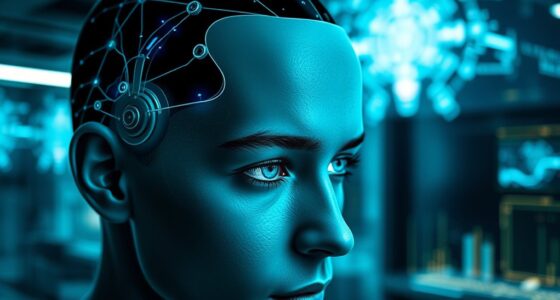In a world increasingly shaped by intelligent machines, your uniqueness lies in your conscious awareness and moral reasoning, which machines can’t replicate. You have the ability to evaluate actions based on empathy, values, and cultural context, shaping your identity and purpose. Machines may mimic responses, but they lack genuine moral intuition and emotional engagement. To understand how these qualities keep humans distinct and essential, explore how inner life and moral judgment define your humanity.
Key Takeaways
- Human consciousness enables moral intuition and emotional understanding, which AI systems lack despite programmed ethical responses.
- Inner life allows humans to create meaning, purpose, and question societal norms beyond machine efficiency.
- Moral reasoning rooted in lived experiences fosters empathy, responsibility, and cultural development unique to humans.
- Genuine moral judgment and introspection sustain human identity and guide responsible progress amid technological advancements.
- AI can mimic responses but cannot replicate the depth of human moral awareness and conscious reflection that define human uniqueness.

Alongside conscious awareness, moral reasoning plays a crucial role in distinguishing humans from machines. You possess the capacity to evaluate actions based on ethical principles, empathy, and social norms. When faced with complex moral dilemmas, you weigh consequences not just logically but emotionally, considering the impact on others. This moral reasoning guides your decisions in ways that go beyond programmed algorithms or data-driven calculations. It’s rooted in an understanding of values, justice, and compassion—traits that are developed through lived experiences and cultural contexts. While AI systems can be programmed to mimic ethical responses, they lack the genuine moral intuition that arises from conscious awareness and emotional engagement. Your ability to navigate morality with depth and nuance is a essential aspect of human identity. This capacity is often enhanced by your engagement in ethical hacking, which involves understanding and applying moral considerations to safeguard systems and users.
This combination of conscious awareness and moral reasoning enables you to create meaning and purpose in ways that machines cannot replicate. You can assign significance to your actions, question societal norms, and aspire to ideals beyond mere efficiency or productivity. These qualities foster creativity, empathy, and a sense of responsibility—traits that shape civilizations and inspire progress. As intelligent machines continue to evolve, your capacity for introspection and moral judgment remains a fundamental feature of what it means to be human. It’s this inner life, filled with conscious awareness and guided by moral reasoning, that will likely preserve the essence of human uniqueness amidst technological advancement.
Frequently Asked Questions
How Might AI Influence Future Human Identity?
AI will shape your future human identity by challenging your understanding of self and consciousness. As you adapt, you’ll develop cultural resilience, maintaining your values amidst technological change. The philosophical implications will prompt you to question what truly defines you—biological or digital. Embracing AI’s influence can deepen your self-awareness, helping you navigate a world where human and machine identities intertwine, ultimately reshaping your sense of purpose and belonging.
Can Machines Ever Replicate Human Intuition Fully?
Machines likely can’t fully replicate human intuition because they lack machine empathy and the nuanced understanding that intuitive algorithms develop from human experiences. You might see AI simulate empathy or decision-making, but true intuition involves emotional context and subconscious insights machines can’t grasp. While AI can mimic aspects of human intuition, the deep, instinctive understanding rooted in human emotion remains beyond their reach, making complete replication unlikely.
What Ethical Concerns Arise From AI Surpassing Human Intelligence?
You should be concerned about ethical issues when AI surpasses human intelligence, especially regarding data privacy and algorithm bias. As AI systems become more powerful, they collect and analyze vast amounts of personal data, risking misuse or breaches. Additionally, biased algorithms can reinforce societal inequalities. It’s vital to develop transparent, fair AI practices to protect individuals’ rights and guarantee technology benefits everyone, not just a select few.
Will Human Creativity Remain Unique in an Ai-Dominated World?
Like a rare gemstone in a vast mine, your creativity remains uniquely yours in an AI world. While AI can mimic artistic expression, your ability to infuse moral reasoning and personal experiences makes your creativity irreplaceable. Human intuition and emotional depth give your work authenticity and soul. So, your creative spirit will continue to stand out, shaping art and ideas in ways AI cannot fully replicate.
How Can Humans Ensure They Retain Emotional Intelligence?
You can guarantee you retain emotional intelligence by actively practicing emotional resilience and empathy development. Focus on understanding your own emotions and responding thoughtfully to others. Engage in conversations that foster connection and listen deeply. Regularly reflect on your emotional responses and seek feedback. By prioritizing these skills, you strengthen your ability to navigate social situations and maintain your emotional intelligence, even as AI advances.
Conclusion
As you navigate this new world alongside intelligent machines, remember that your creativity, empathy, and moral judgment are your unique strengths—like a lighthouse guiding ships through fog. Machines may process data quickly, but they can’t replicate your ability to connect, imagine, and feel. Embracing these qualities guarantees you remain irreplaceable in a landscape rapidly reshaped by technology. Stay true to what makes you human, like a rare gem shining brightly amid the digital age.









